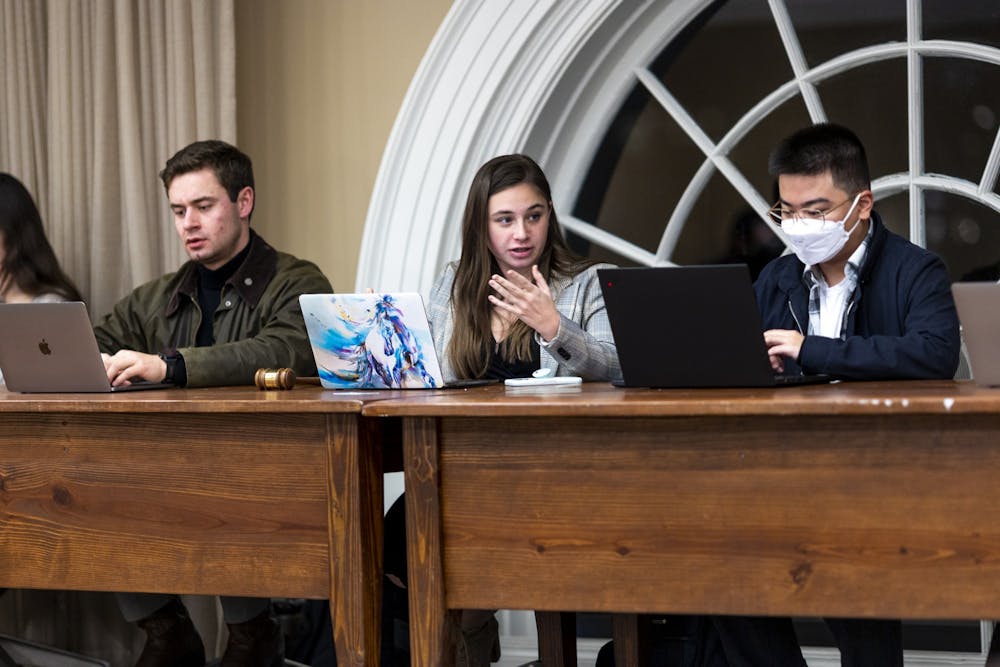It has been almost a year since the student body voted to reform the Honor Committee’s 180-year-old single sanction system. Recent developments suggest that the progress we witnessed last semester may be in jeopardy. Four proposals were introduced last week in preparation for when a multi-sanction constitution is eventually drafted. While we recognize the necessity of a multi-sanction system, these proposals — much like the process that produced them — are deeply problematic. As long as the Committee continues to operate with a lack of transparency, no true progress will ever be made to their system.
This past fall, the Committee announced they would be holding a Constitutional Convention to solicit feedback for a multi-sanction system. The Committee invited delegates from Contracted Independent Organizations to participate in the convention — this invitation was a single sentence at the end of the email announcing the Convention which asked CIOs to email the Committee if they were interested in attending. Of the hundreds of CIOs on Grounds, 30 reached out. The Committee made no discernable public attempt to further advertise their invitation. Special Status Organizations — including the University Judiciary Committee, which currently operates under a multi-sanction system and has for years — were also excluded. The whole point of the Convention was to solicit feedback and draft language for a multi-sanction system, but the Committee’s lack of preparedness ultimately prompted the delegates to crank out proposals behind closed doors days before the start of this semester.
The first proposal has a panel of non-Committee members convict students on either of two standards — “clear and convincing evidence” or “beyond a reasonable doubt.” A separate all-Committee panel would then decide the appropriate sanction based upon the standard of conviction. The second proposal staffs the two panels in the same way, but the available sanctions are determined based on whether or not the initial guilty verdict was unanimous — “the full range of sanctions” only being available when the guilty panel is unanimous. In contrast with the first two, the third proposal says the panel that determines guilt should also include Committee members. The last proposal has one group of non-Committee and Committee members decide both guilt and sanction.
If you struggled to understand these, you’re not alone. Much like with the Convention, the Committee hasn’t attempted to explain anything about these proposals to the student body. They are incredibly confusing, and what’s more, each is riddled with problems. Sanctions should be proportionate to the offense committed, not the standard of evidence or the number of votes in favor of the conviction. The proposals are also unethical — having a panel which convicts students and having another which sanctions students may lead to significant miscommunications between the two groups. A two-panel system may also stretch out the already notoriously long processing timeline for cases. While the proposals are problematic, they are only a reflection of the system which led to their creation.
At the end of the day, these are just proposals, drafted by students who were ill-prepared and short on time. The Committee must recognize the ideas presented in these plans do not envision the multi-sanction system that the student body deserves. We vehemently oppose any constitution that is only focused on punishing students and destroying their academic careers. One-size-fits-all sanctions — like permanent transcript notations or two-semester leaves of absences — are overly punitive and merely reactive. A new constitution should allow the Committee to hold these types of punitive measures in abeyance, in order to deter future violations of the honor code. The Committee should focus primarily on creating new sanctions that help convicted students learn from their mistakes while rebuilding trust within the community — much like the process already used by the University Judiciary Committee. Reforms of this nature would foster a system of justice that recognizes nuance and promotes restoration.
Let us be clear — we need an Honor system that recognizes that no two situations are the same and that everyone deserves a second chance. Preventative education is always more effective than reactive punishments. While we appreciate the Committee’s recent efforts to rethink how we safeguard our Community of Trust, this process will be unsuccessful if it relies on these flawed proposals produced by an unrepresentative slate of delegates. The Committee must work to increase transparency if it wants to achieve the necessary changes — amending the constitution behind closed doors limits exposure to the student body, and we will not vote for a constitution that we do not understand. This moment is an opportunity to create a system that is representative, accessible and rehabilitative. We are at the precipice of a new beginning for the Committee. Committee members must decide if they want this next chapter to be any better than the last.
The Cavalier Daily Editorial Board is composed of the Executive Editor, the Editor-in-Chief, the two Opinion Editors, their Senior Associates and an Opinion Columnist. The board can be reached at eb@cavalierdaily.com.







